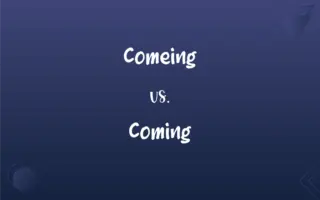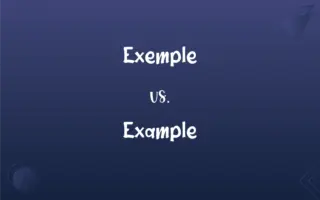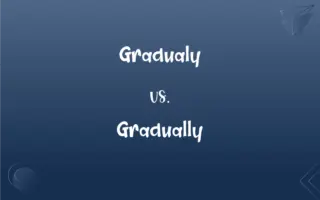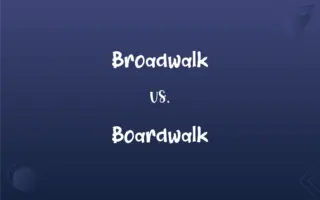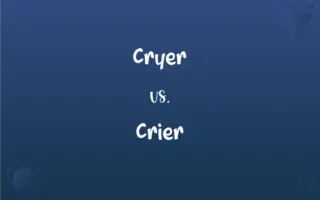Catched vs. Caught: Mastering the Correct Spelling
Edited by Aimie Carlson || By Janet White || Updated on March 8, 2024
Catched is incorrect spelling; the correct spelling is caught. Caught is the past tense and past participle of the verb 'catch'.

Which is correct: Catched or Caught
How to spell Caught?

Catched is Incorrect

Caught is Correct
ADVERTISEMENT
Key Differences
Visualize the word 'catch' and replace 'ch' with 'ught' for past tense.
Think of 'caught' rhyming with 'thought', both ending with 'ught'.
Recall irregular verbs like 'catch' often change vowel sounds when in past tense.
Use mnemonic i.e. "You catch a ball, but yesterday you caught it."
Remember 'caught' as the standard past tense of 'catch', similar to 'taught' from 'teach'.
ADVERTISEMENT
Correct usage of Caught
I catched a glimpse of the celebrity as she walked by.
I caught a glimpse of the celebrity as she walked by.
They catched up with us at the park.
They caught up with us at the park.
He has catched a cold from the rain.
He has caught a cold from the rain.
She catched the ball during the game.
She caught the ball during the game.
The police catched the thief in the act.
The police caught the thief in the act.
Caught Definitions
Trapped or ensnared in a situation.
He was caught in a dilemma.
Successfully captured or seized.
The thief was caught by the police.
Became infected or affected.
She caught a cold during winter.
Perceived or noticed something.
Her singing caught my attention.
Involuntarily involved or implicated.
He got caught in the rain.
Past tense and past participle of catch.
(cricket) Of the method of being out in which the striker hits the ball and a fielder catches it.
Simple past tense and past participle of catch
Caught Sentences
The cat caught a mouse in the garden.
They caught the mistake before the report was published.
I've never caught a fish this big before!
He caught the flu last winter and was sick for weeks.
She caught the early bus to get to work on time.
I caught the irony in her voice.
The photographer caught the perfect moment for the photo.
We caught a taxi to the airport.
He caught a glimpse of the mountain through the clouds.
He caught the ball just inches from the ground.
They caught the scent of fresh bread as they walked past the bakery.
I caught my breath as I reached the top of the hill.
She caught her sleeve on the door handle.
The firefighter caught the child who jumped from the burning building.
The detective caught the pattern in the suspect's behavior.
He caught her eye across the room.
The goalkeeper caught the ball, preventing a goal.
They caught the last train home.
She caught the meaning behind his words.
We caught up on all the news over coffee.
I caught the excitement in her voice.
She caught herself before she said something she would regret.
She caught the error in the document just in time.
She caught the rhythm of the music and danced along.
They caught wind of the changes before they were officially announced.
Caught Idioms & Phrases
Caught my eye
Something that grabbed my attention or interest.
The painting in the window caught my eye as I walked by.
Caught a break
To experience good luck or find an opportunity by chance.
We caught a break when the weather cleared up just in time for our picnic.
Caught off guard
To be surprised by something unexpected.
I was caught off guard by the sudden question.
Caught up in
To become involved in something, often without intending to.
He got caught up in the excitement of the crowd.
Caught by surprise
To be taken aback by something unexpected.
The announcement caught everyone by surprise.
Caught short
To be in a situation where you find yourself lacking something necessary.
I was caught short without an umbrella in the sudden rainstorm.
Caught your breath
To pause and rest to regain normal breathing, especially after exertion.
After running to catch the bus, I finally caught my breath.
Caught in the middle
To be in a situation where you are affected by a conflict between other parties.
I always seem to be caught in the middle of my friends' arguments.
Caught in a lie
To be discovered telling a falsehood.
He was caught in a lie when his alibi didn't hold up.
Caught the drift
To understand the general meaning of what someone is saying.
I didn't catch every word, but I caught the drift of his speech.
Caught in a bind
To be in a difficult or problematic situation with no easy way out.
I was caught in a bind when I had to choose between two important commitments.
Caught in the act
To be discovered doing something wrong or illegal.
The thief was caught in the act by the security cameras.
Caught the bug
To become enthusiastic about a new hobby, interest, or activity.
Ever since she tried skiing last winter, she's really caught the bug.
Caught flat-footed
To be completely unprepared for something.
The sudden exam caught most students flat-footed.
Caught between two stools
To be unable to choose between two alternatives because they are equally appealing or unappealing.
I'm caught between two stools, unable to decide whether to take the job offer in the city or stay in my hometown.
Caught the mood
To successfully understand or reflect the general feeling or atmosphere.
The music at the party really caught the mood of the evening.
Caught up with
To reach someone who is ahead in some way or to bring someone up to date.
After studying hard, I finally caught up with the rest of the class.
Caught in a storm
To be outside during a storm.
We were caught in a storm while hiking and had to seek shelter.
FAQs
What is the verb form of caught?
The verb form is 'catch'.
What is the root word of caught?
The root word is 'catch'.
Why is it called caught?
It is called caught as it's the past tense of 'catch', following irregular verb patterns.
What is the plural form of caught?
Caught does not have a plural form; it remains 'caught' for both singular and plural subjects.
Is caught an abstract noun?
No, caught is not a noun; it's a verb form.
Which vowel is used before caught?
The vowel 'a' is used before 'ught' in caught.
Is caught an adverb?
No, caught is not an adverb.
What is the pronunciation of caught?
Caught is pronounced as /kɔːt/.
What is the singular form of caught?
The singular form is 'caught'.
Which preposition is used with caught?
Prepositions like 'in', 'by', and 'with' are used with caught.
Is caught a vowel or consonant?
Caught is a word, not a vowel or consonant.
Is caught a collective noun?
No, caught is not a collective noun.
Is the caught term a metaphor?
Caught can be used metaphorically but is not inherently a metaphor.
What is the opposite of caught?
The opposite of caught could be 'released' or 'escaped'.
Which determiner is used with caught?
Determiners like 'the', 'a', or 'an' are used with caught.
What is the second form of caught?
The second form is 'caught' (past tense).
What is the third form of caught?
The third form is 'caught' (past participle).
Which conjunction is used with caught?
Conjunctions like 'and', 'but', or 'or' can be used with caught.
Is caught a negative or positive word?
Caught is neutral; context determines its connotation.
Is caught a countable noun?
No, caught is not a noun.
How do we divide caught into syllables?
Caught is a single-syllable word: caught.
What is a stressed syllable in caught?
The entire word 'caught' is stressed as it is one syllable.
What part of speech is caught?
Caught is a verb (past tense and past participle).
What is another term for caught?
Another term could be 'captured' or 'snared'.
What is the first form of caught?
The first form is 'catch'.
Is the word caught imperative?
No, caught is not an imperative; it's a past tense verb.
How many syllables are in caught?
There is one syllable in caught.
How is caught used in a sentence?
Caught is used as a verb, e.g., "She caught the ball effortlessly."
Which article is used with caught?
Articles like 'a', 'an', or 'the' are used with caught.
Is caught a noun or adjective?
Caught is a verb (past tense and past participle of catch).
About Author
Written by
Janet WhiteJanet White has been an esteemed writer and blogger for Difference Wiki. Holding a Master's degree in Science and Medical Journalism from the prestigious Boston University, she has consistently demonstrated her expertise and passion for her field. When she's not immersed in her work, Janet relishes her time exercising, delving into a good book, and cherishing moments with friends and family.
Edited by
Aimie CarlsonAimie Carlson, holding a master's degree in English literature, is a fervent English language enthusiast. She lends her writing talents to Difference Wiki, a prominent website that specializes in comparisons, offering readers insightful analyses that both captivate and inform.
